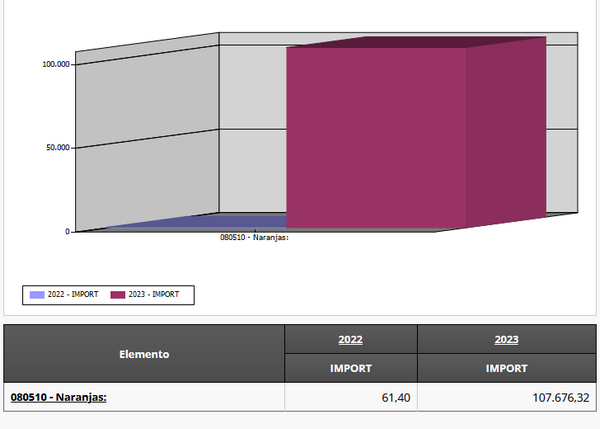If we compare the data on imports of Egyptian oranges in Spain between 2022 and 2023, it is undeniable that purchases have skyrocketed dramatically in just one year.
According to Datacomex data, while in all of 2022 imports totaled 61.40 tons, in the period from January to September 2023 (the months for which official statistics are available) the volume has multiplied by more than 1,750 and amounts to 107,676.32 tons.

Total imports of product group '080510 - Oranges' from '220: Egypt' with mode of transport: 'All transports' delivery conditions: 'All conditions' in the period: '2022 (provisional), 2023 (provisional)'. Units: 'Tons'. Source: Datacomex.
If we look at the figures by autonomous regions, Andalusia imported 4,609 tons; a considerable amount, but more than doubled by Catalonia, which acquired 9,778 tons of Egyptian oranges, still far behind the 39,821 tons imported by the Region of Murcia or the 44,019 tons imported by the Region of Valencia. In fact, these last two autonomous regions combined account for 78% of the total imports of Egyptian oranges this year, according to official figures.
"Indeed, imports from Egypt recorded spectacular growth last season," said Eduardo Eraso, citrus specialist and technical manager of Asaja Cordoba. "Obviously, what we want at Asaja is that, whatever the product and the country it comes from, the Ministry of Agriculture and the Government control and require reciprocity in phytosanitary standards and treatments. Even more so in the case of oranges, which mainly affects us producers in the Vega del Guadalquivir, where almost half of the Spanish production is harvested."
"Last year, Egypt was the EU's largest supplier of oranges, and we believe that one of the main reasons for this was that South Africa was asked for its oranges to undergo cold treatment to be able to export to Europe. That resulted in higher costs, so less South African citrus reached the European market, while the shipments of Egyptian oranges increased."
"However, ideally, the Ministry should ask the European Union to require citrus fruits from every country, including Egypt, to undergo cold treatment, as shipments of Egyptian oranges with black spot have already been detected."
Eduardo Eraso.
"It should be pointed out that even if imports are allowed only until a given date, so as to prevent overlap with the Spanish campaign, they are still causing us significant damage, because the fruit is stored in chambers and the marketing of Spanish oranges at the beginning of the season is affected."
"Here in Andalusia, the drop in the production this year has been greater than in other producing areas due to the drought and irrigation restrictions, which have been stricter than in other orange producing areas, as well as to the high temperatures recorded in May and June; in fact, on average, the harvest has been reduced by more than 20%, but some farms will see their production drop by 40%. However, the largest citrus traders, many of which sell Andalusian citrus, are in the Region of Valencia, and that is why most of the imports in 2023 are recorded there," said Eduardo.
The season's prospects suggest that this will not be a one-off situation, and that in the 2023/2024 campaign, the import of Egyptian oranges by Spanish companies will again reach very high levels. "Unfortunately, this could set a precedent. I believe that those figures won't be easily reduced, and that they will even continue to increase, unless the Spanish production recovers soon, or Egyptian fruit starts to be required to undergo cold treatment," said Eduardo Eraso.
For more information:
Asaja Córdoba
Tel.: +34 957 48 06 00
[email protected]
www.asajacordoba.es
